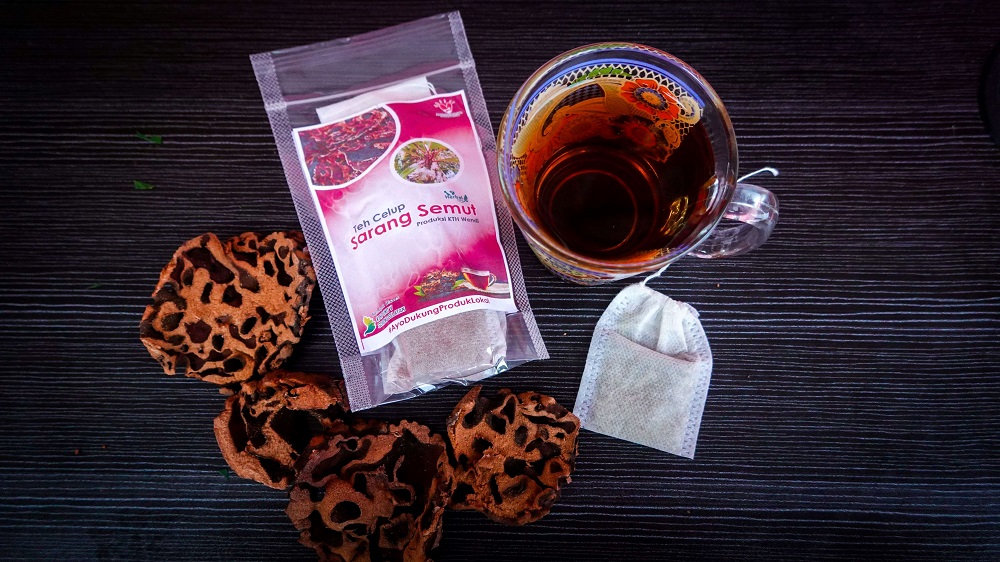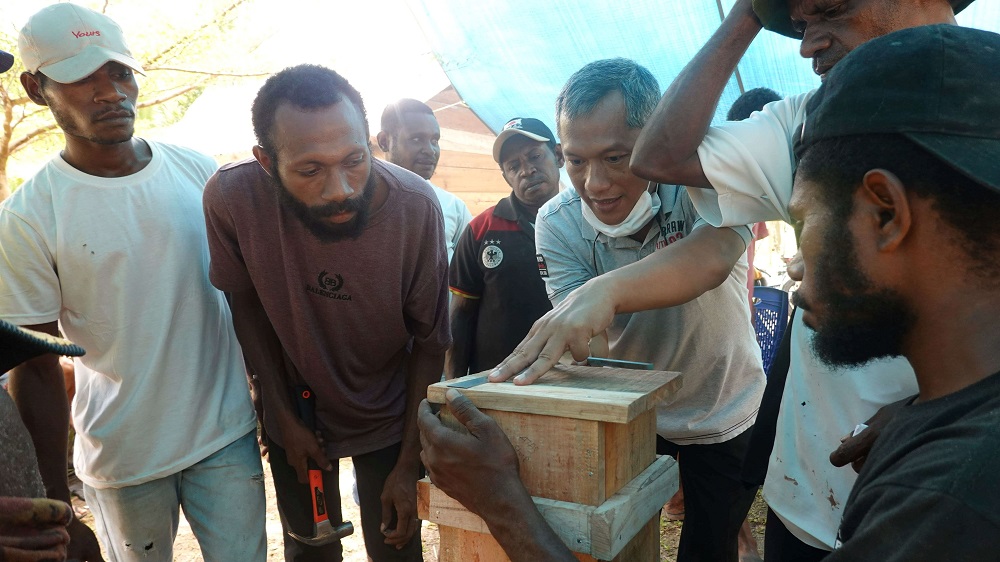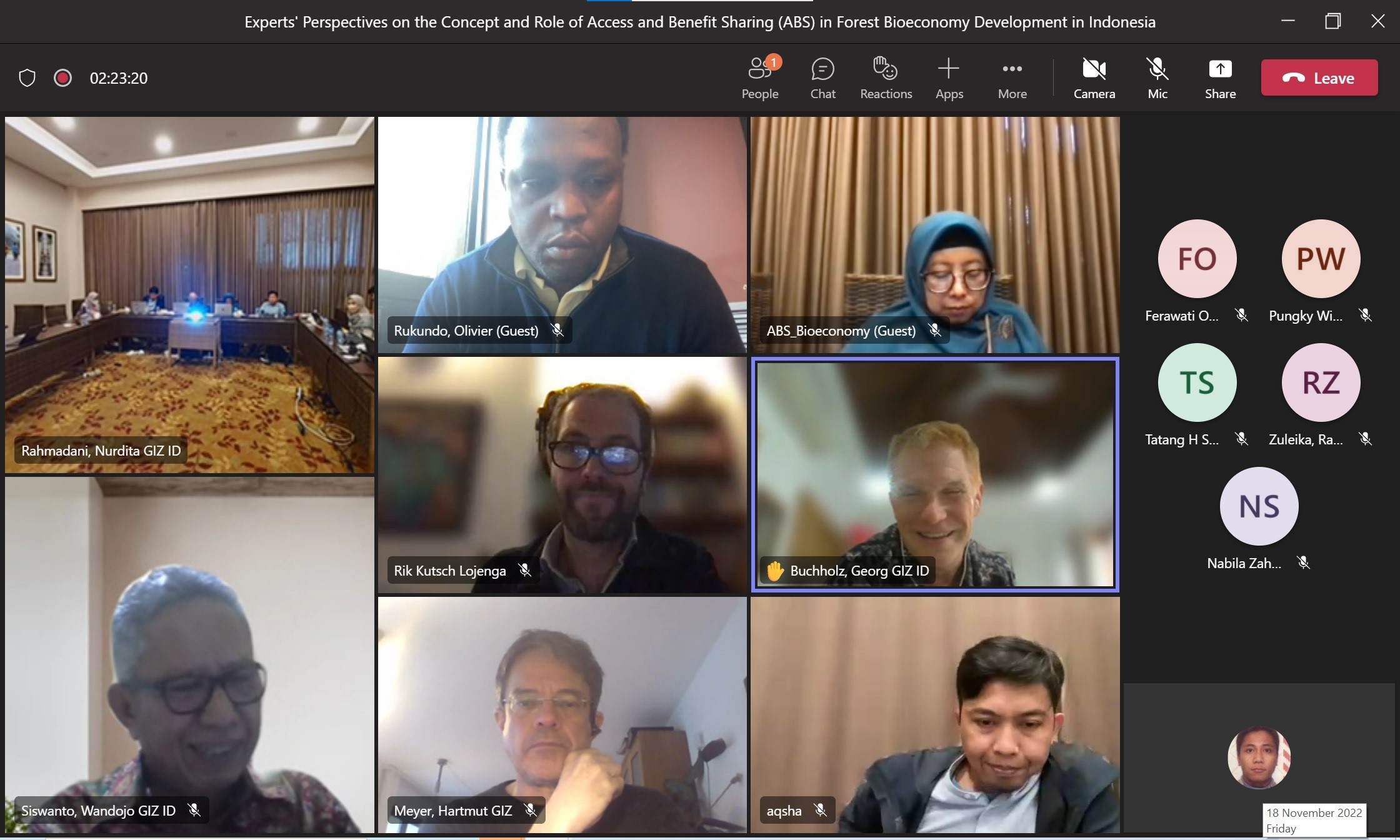FORCLIME
Forests and Climate Change ProgrammeTechnical Cooperation (TC Module)

Select your language

Sarang semut (Myrmecodia spp) is a plant that is commonly found in Papua and is believed to have various health benefits. The word “Myrmecodia” derives from the Greek language and means “surrounded by ants”. The plant itself features a perforated shape and is indeed used as a nest by ants. The people of Wendi Village in South Sorong Regency, West Papua have for many years sold sarang semut in the form of dry lumps directly to collectors in Sorong City. In an effort to improve the economic conditions of the villagers around the forest area, as well as to increase the capacity of the community to manage its local resources, the West Papua Forestry Service, supported by FORCLIME, held recent training sessions on the production of tea from Myrmecodia or sarang semut tea. Sarang semut (Myrmecodia spp.) is a potential non-timber forest product from Wendi Village which has for long been managed as a traditional medicine. The training was given to three forest farmer groups in Wendi Village, namely Wendi 1, Wendi 2 and Lembah Hijau, while the training sessions, which were attended by 116 people (54 male and 62 female), were held over two days from 28 -29 November 2022. The participants, apart from being taught how to make tea from the Mymecordia spp plant, were also taught how to package their herbal drink into a purchasable product ready for sale.
Currently, the raw materials required for making the sarang semut tea are sourced directly from the natural environment. To maintain the sustainability of these raw materials, forest farmer groups in Wendi Village include sarang semut cultivation as a part of their work programme.
The next stage after this training is assistance for forest farmer groups in relation to the clinical testing of their products so that they will ultimately be able to secure sales permits from the Food and Drug Supervisory Agency (BPOM). Facilitation will also be provided to forest farmer groups in relation to the marketing of their products through marketing training so that they will be able to properly access the available markets, both traditional markets and various types of marketplaces.
For more information, please contact:
Melanesia Brigite Boseren, Junior Advisor for Rural Livelihood, Forest Management and Conservation
Nita Yohana, Adviser for Sustainable Forest Management and Coordinator for West Papua Province
Mohammad Sidiq, Strategic Area Manager for Sustainable Forest Management and Coordinator for Papua and West Papua Provinces

In an effort to empower the communities of target villages, FORCLIME recently held a series of training sessions on stingless honeybee farming in conjunction with the West Papua Provincial Forestry Service and the Forest Management Unit of Sorong Selatan for forest farmers groups in two supported villages in West Papua Province, specifically the villages of Wendi and Haha which are located in South Sorong Regency. The training activities were held from 21 – 22 November 2022 in Wendi and from 23 – 24 November 2022 in Haha. The training participants comprised three groups of forest farmers from Wendi (Wendi 1, Wendi 2, Lembah Hijau) and three from Haha (Imian, Sesna and Nagi).
The participants received training from a stingless honeybee expert, Dr. Mahani, SP., M.Sc. from the Faculty of Agricultural Industrial Engineering at the University of Pajajaran. The types of stingless honeybees that were introduced during the training sessions were the Tetragonula biroi and the Heterotrigona itama species.
During the training, the participants learned about several areas relating to the species in question, including:
1. Beekeeping techniques for the superior Trigona.
2. How to identify and select stingless bees for bee farming.
3. How to make beekeeping boxes (‘stup’).
During the training, the participants practiced making the stup beekeeping boxes and also gained knowledge based on expert experience in honeybee cultivation, including the economic prospects relating to this time-honored activity.
In the local language, stingless bees are known as 'hok' while bees that sting are called 'towa'. Local people have used hok honey since ancient times, however, to date they have not yet cultivated it for commercial purposes. Through the recent training sessions though, the villagers learned how to develop beekeeping within an economic context in the hope that they will be able to generate additional income for their villages in the future.
For more information, please contact:
Melanesia Brigite Boseren, Junior Advisor for Rural Livelihood, Forest Management and Conservation
Nita Yohana, Adviser for Sustainable Forest Management and Coordinator for West Papua Province
Mohammad Sidiq, Strategic Area Manager for Sustainable Forest Management and Coordinator for Papua and West Papua Provinces

Continuing with the series of FGDs on the development of national forest bioeconomy policies in Indonesia, FORCLIME, supported by Bappenas, held a recent FGD that addressed the potential of the forest product processing industry and the role of Access and Benefit Sharing (ABS) in supporting forest bioeconomy development in Indonesia. This FGD was held on 18 November 2022 in Yogyakarta and was also conducted online.
The meeting was opened by Mrs. Dr. Nur Hygiawati Rahayu, ST, MSc, Director of Forestry and Water Resources Conservation at the Ministry of National Development Planning/Bappenas, and was divided into two sessions. During the first session, the FGD focused on the potential development of forest products to support the bioeconomy. The first resource person taking part in this session was Mrs. Aida Greenbury of the World Bioeconomy Forum. Mrs. Greenbury offered an overview of current issues relating to international bioeconomy forums, as well as examples of existing bioeconomy development strategies that are being pursued in other countries. Some of the enabling conditions required to support bioeconomy development include the availability of bio-databases, regulation of the roles and responsibilities of key ministries, investment research and analysis, demand formation and market ecosystems, and international cooperation.
The next resource person to offer insights into this area was Mrs. Merrijantij Punguan Pintaria, ST, M.Eng, who is the Director of the Forest and Plantation Products Industry at the Ministry of Industry. Mrs. Merrijanti provided information on the profile and performance of the forest and plantation product industry and the economic conditions of global manufacturing, as well as policies in Indonesia that have the potential to support the development of the bioeconomy industry. Coordination of the upstream/downstream industry with the Investment Coordinating Board/Badan Koordinasi Penanaman Modal (BKPM) also represents an important form of capital capable of encouraging investment in accordance with domestic requirements and as a part of efforts aimed at increasing the strength of the upstream sector, including the forestry sector.
During the second session, the discussion focused on the concept and role of ABS in supporting bioeconomy development. The resource persons for this session were Mr. Hartmut Meyer and Mr. Olivier Rukundo from GIZ and Mr. Rik Kutsch Lojenga from the Union for Ethical Biotrade. These two experts explained that ABS could offer legal certainty to owners of genetic resources and researchers, as well as encourage product development and guarantee fair profits for the parties involved. ABS implementation requires a clear policy framework and strong coordination between relevant ministries and government agencies. There are a number of best practices for the implementation of ABS that provide benefits for a country, however, in some countries, ABS actually hinders the development of research into genetic resources. Therefore, a thorough analysis of the existing legal frameworks must be carried out to avoid any duplication or conflict with existing regulations.
For more information, please contact:
Nurdita Rahmadani, Junior Advisor for Monitoring, Evaluation and Reporting
R. Rizka Dewi Zuleika, Junior Advisor for Sustainable Forest Management
Pipin Permadi, Senior Advisor and Liaison Officer
Wandojo Siswanto, Strategic Area Manager for Forest Policy and Climate Change
 |
Supported By: |
  |